SPAIN
Salou

Salou
Salou
The famous seaside resort of Salou is located on the Spanish Costa Dorada (Golden Coast) in Catalonia. Salou belongs to the province of Tarragona. Salou has more than 26,000 inhabitants and an area of 15 km². In the summer months, crowds of tourists flock to this pleasant seaside resort every year. Salou has already won several awards as a holiday destination for young and old. The Spanish resort is located on the Mediterranean Sea and is not far from the island of Mallorca.
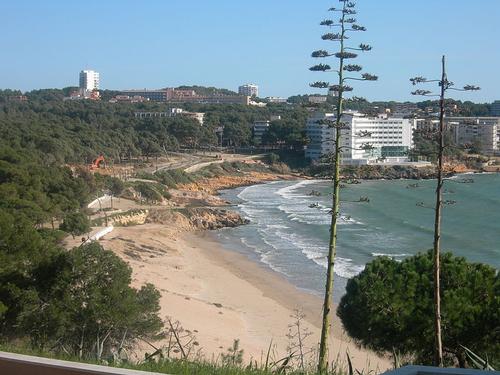 SalouPhoto: Xmulero001 in the public domain
SalouPhoto: Xmulero001 in the public domain
Location
Salou is located in the middle of the Costa Dorada, or Gold Coast, on Spain's lovely Mediterranean coast. When you arrive at Reus Airport, it is only a short bus ride to arrive in Salou. Once in Salou, other nice places such as Tarragona and Reus are not far away and the center of Barcelona is about 110 kilometers away and is a great choice for a day trip.
Weather
Salou is located on the Mediterranean Sea and has a Mediterranean climate. The presence of the sea ensures warm (often even hot) summers and mild winters. August is the hottest month for Salou; the average temperature is then 30°C. In the winter months it is often still pleasant in Salou. The average temperature in the coldest month (January) is 14°C. From March to November there is a chance of very high temperatures in Salou and in May there is the greatest chance of precipitation.
History
Salou's modern appearance may suggest that the city was built from the ground up, but its history goes back a long way. Both the Greeks and the Romans took advantage of the city's location by using it as a port. This port was also regularly used as a base for the Spanish conquests in the Middle Ages. Afterwards the city fell into disrepair, but when a railway line was built in 1865, the city grew again and became a much visited place. Ultimately, this growth and the good accessibility led to its status as a tourist attraction.
Sights
Salou is best known for its exuberant nightlife, what many do not know is that Salou also has several attractions that are certainly worthwhile. Take, for example, the city park of Salou on Avinguda de Carles Buïgas with an area of almost 16 km². In contrast to the rest of Salou, the city park is wonderfully quiet, even in high season. There are many different plant species and flowers in the park. You can also choose to sit in the sun at one of the ponds and other water features in the park.
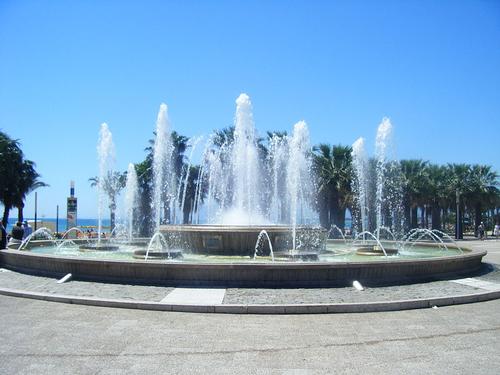 Illuminated Fountain SalouPhoto: Andy CC 3.0 Unported no changes made
Illuminated Fountain SalouPhoto: Andy CC 3.0 Unported no changes made
On the Passeig de Jaume I in Salou you will find an attraction that enchant many loving couples every year. Here you can find the illuminated fountain that was designed and built in 1973 by the architect Carles Buïgas. The colors and shapes of the illuminated fountain change every minute and a half and are a true spectacle.
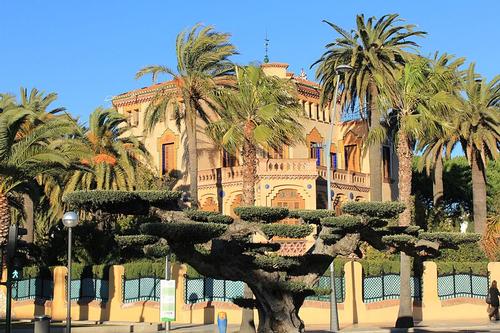 Bobet House SalouPhoto: Ferran Llorens CC 2.0 Generic no changes made
Bobet House SalouPhoto: Ferran Llorens CC 2.0 Generic no changes made
The Bonet house is almost a century old and is a wonderful example of the kind of Art Nouveau architecture that early 20th century masters produced in Spain. One of Gaudi's students, Domènec Sugranyes i Gras, designed and built this stylish Art Nouveau building. Each room is richly decorated with murals depicting historical scenes. The architect's philosophy is engraved on a ceramic sundial in the garden - 'take advantage of time that passes and never returns'.
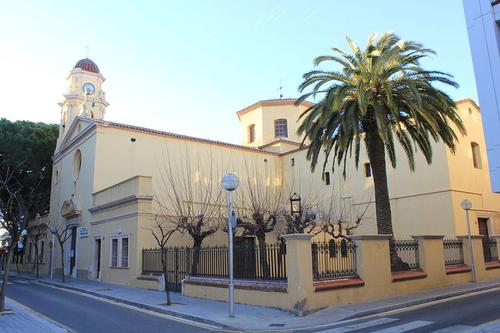 Santa Maria del Mar SalouPhoto: Ferran Llorens CC 2.0 Generic no changes made
Santa Maria del Mar SalouPhoto: Ferran Llorens CC 2.0 Generic no changes made
In 1766 the construction of the Santa Maria del Mar church in Salou was completed. The church was originally built as a church for the sailors of Salou. The beautiful Santa Maria del Mar church is definitely worth a visit. On the outside of the church are impressive reliefs depicting fishing activities.
 Torre Vella SalouPhoto: Public domeain
Torre Vella SalouPhoto: Public domeain
The Torre Vella (old tower) is another impressive structure in Salou. This tower was built as early as 1530 by order of the Archbishop of Tarragona and is the oldest building in Salou. The tower was built to protect the port city of Salou from pirates. Salou was an important strategic place early in history, because Mallorca is easily accessible from the port of Salou. Next to the Torre Vella you can find an outbuilding dating from the 17th century. Cultural activities are regularly organized here. Opposite this beautiful old tower is another historic landmark of Salou: the old railway line with station building from 1857.
Tips
Salou's nightlife swings 365 days a year. On the boulevards of Salou there are always props to hand out flyers to lure you to one of the many hip clubs and bars. You can find all kinds of entertainment in Salou such as clubs, pubs, cafes, an discos.
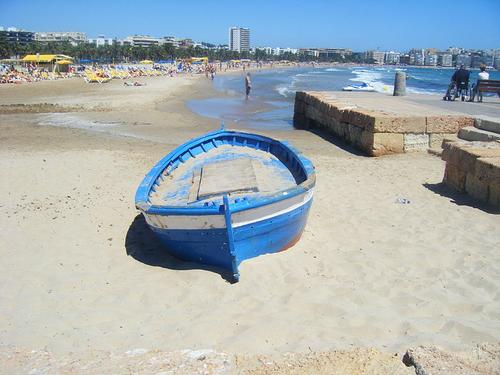 Salou BeachPhoto: Andy C CC3.0 Unported-licentie no changes made
Salou BeachPhoto: Andy C CC3.0 Unported-licentie no changes made
The municipality of Salou has a day's work to maintain the city's main attractions, the beaches. There are more than 7.5 kilometers of beaches in Salou and, moreover, the beaches of this Spanish town have been officially declared safe for children. Most tourists come to Salou to enjoy the beautiful sandy beaches and idyllic bays on the turquoise waters of the Mediterranean. Salou has a total of eight beaches and bays:
- Playa Llevant
- Cala Llenguadets
- Cala Crancs
- Playa Ponent
- Cala Penya Tallada
- Playa Capellans
- Cala de la Font
- Playa Llarga
Salou has a hilly environment and beautiful sandy beaches with azure blue water. Several rugged rocks can be found in Salou and the surrounding area. The Mediterranean is home to many different types of fish and on the mainland of Salou, Spain you can see many butterflies and some special birds flying.
A great diversity of plants, trees and colorful flowers grows in Salou. In addition, many types of herbs simply grow on the side of the street, such as thyme and rosemary. There are several nature parks, such as Els Ports de Tortosa, where you can see this beautiful flora.
Useful links Salou
BBC Country ProfilesWorld Fact Book Explore all Countries
How to call
Last updated January 2026
Copyright: Team - The World of Info